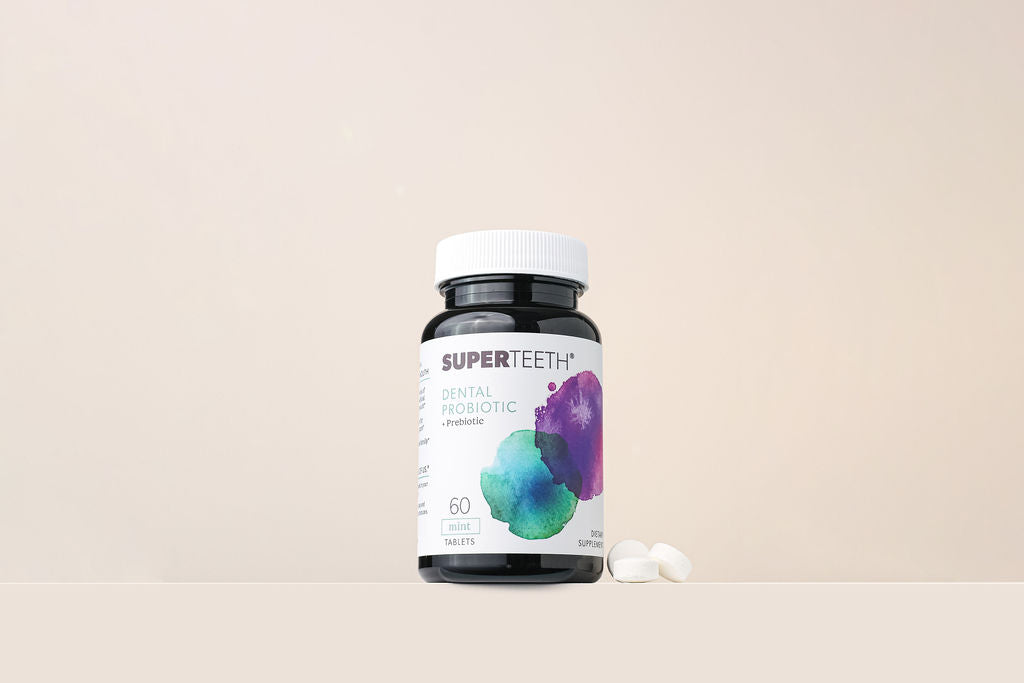Clinical Studies

STREPTOCOCCUS SALIVARIUS M18
Study: Carriogram outcome after 90 days of oral treatment with Streptococcus salivarius M18 in children at high risk for dental caries: results of a randomized, controlled study
Study Overview: The study was performed in Milan, Italy and was published in 2015. 76 children, ages 6-17, participated in the study. Half of the children took one dental probiotic tablet a day for three months, while the other half did not receive anything. At the completion of the study, the children taking the dental probiotic had plaque reduced by 50% and the bad bacteria (Streptococcus mutans) reduced by 75%.
Study: A concerted probiotic activity to inhibit periodontitis-associated bacteria
Study Overview: In this study, the inhibitory effect of the probiotic Streptococcus salivarius M18 and K12, Streptococcus oralis subsp. dentisani 7746, and Lactobacillus reuteri ATCC PTA 5289 on anaerobic periodontal bacteria was tested. Probiotics and periodontal pathogens were co-incubated anaerobically in a mixture of autoclaved saliva and brain heart infusion broth. S. salivarius M18 had the most constant inhibitory potential against all pathogens, including P. gingivalis (the bacteria primarily responsible for gingivitis and periodontist).
Study: Probiotics in Periodontal Therapy
Study Overview: The study was performed in Mangalore, India and was published in 2015. The study consisted of 28 adults between the ages of 20 and 60 years old. The study was performed over a two month period, with half of the participants receiving a dental probiotic tablet for the first month and the other half of participants receiving no tablets. At the end of the first month, plaque and gingival levels had improved only for the participants receiving the dental probiotic. At the end of the study, after not receiving a tablet for the second month, plaque and gingival levels slightly worsened but were still significantly less for participants who received the dental probiotic tablet.
LACTOBACILLUS REUTERI
Study: Consumption of Lactobacillus reuteri-containing lozenges improves periodontal health in navy sailors at sea: A randomized controlled trial
Study Overview: The study was performed on a German Naval Ship and was published in 2020. This was a randomized, double-blind study which included 72 crew members. For 42 days, half of the crew members received a dental probiotic tablet containing Lactobacillus reuteri, while the other half received a placebo. At the completion of the study, the group taking the dental probiotic showed a reduction in gum inflammation by approximately 62%, a decrease in plaque levels by approximately 8%, and a decrease in bleeding from probing by 75% by the end of the study. The placebo group saw increases in all three categories.
Study: Oral Colinisation after the Administration of Drops Containing Lactobacillus reuteri
Study Overview: The study was performed in Gothenburg, Sweden and was published in 2020. The study consisted of 13 adults in their mid-twenties. The study was performed over nine weeks: four weeks with all participants receiving a probiotic lozenge and five weeks following the subjects post treatment. By the end of the four weeks of subjects receiving a daily probiotic containing Lactobacillus reuteri, the number of cavity causing bad bacteria, Streptococcus mutans, had significantly decreased from the start of the study. The study also highlighted that the population of Lactobacillus reuteri in the mouth began to decrease once the probiotics were no longer administered, indicating that continual consumption is key to sustaining Lactobacillus reuteri in the oral cavity.
LACTOBACILLUS PARACASEI
Study: Effect of Long-Term Consumption of Lactobacillus paracasei SD1 on Reducing Mutans streptococci and Caries Risk: A Randomized Placebo-Controlled Trial
Study Overview: The study was performed in Thailand and was published in 2015. The study consisted of 122 children ages 12-14 years old. The study was performed over the course of one year with half of the children receiving milk containing Lactobacillus paracasei for the first six months, then monitored for the second six months. The other half of children received milk without Lactobacillus paracasei for the full year. The children who were high risk for dental caries and received the probiotic milk experienced a significant decrease in the cavity causing bad bacteria Streptococcus mutans and showed a reduced risk for dental caries. Once the probiotic group stopped receiving the probiotic milk at six months, the Streptococcus mutans levels began to increase again, which suggests that long-term consumption of the probiotic is an essential factor in maintaining sufficient quantities of Lactobacillus paracasei in the mouth.

